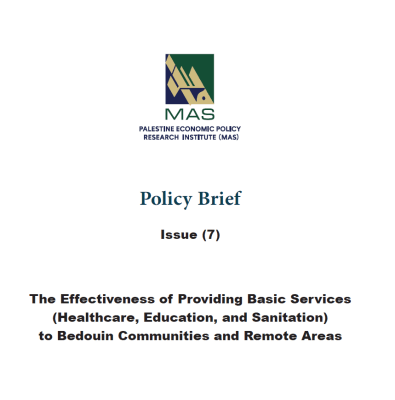The Effectiveness of Providing Basic Services (Healthcare, Education, and Sanitation) to Bedouin Communities and Remote Areas
The Palestine Economic Policy Research Institute (MAS) held its fifth roundtable session this year, to discuss “The Effectiveness of Providing Basic Services (Healthcare, Education, and Sanitation) to Bedouin Communities and Remote Areas”, bringing together a group of stakeholders, experts, and interested parties. The session and background paper were funded with support from the Heinrich-Böll Stiftung.
Bedouin communities in the West Bank are among the most vulnerable population groups, mainly living in Area “C” across the various governorates of the West Bank. The occupation’s systematic policy of settlement expansion relies on establishing random settlements and outposts, which has been recently accelerated, especially after the events of October 7, 2023, through the gradual seizure of Palestinian lands as part of various ongoing confiscation decisions.
Bedouin communities depend heavily on livestock as their primary source of livelihood, which has been constantly targeted in attacks, sometimes through confiscation and sometimes by restrictions on grazing areas. These measures force Bedouin communities to purchase fodder, resulting in financial burdens due to the cost of buying and transporting it to their communities.
Furthermore, Bedouin communities experience significant barriers to accessing essential services, which has led to the deterioration of their social, economic, and health conditions. They are denied their right to safe drinking water, prevented from building electricity networks and sewage systems, and forced to live in temporary housing under the constant threat of demolition by Israel. The occupation forces also prevent the construction of schools and healthcare clinics
and refuse to grant licenses for them. Even when schools and clinics are built, they are often demolished, regardless of whether international organizations funded them. All of this compound the suffering of all segments of Bedouin society—children, women, and men—and deprives them of their basic right to live in dignity.

